(单词翻译:单击)
Last Year at Marienbad
《去年在马里昂巴德》(1961)
"Didn't we meet at Marienbad last year?" an unnamed man asks an unnamed woman. So begins one of the most confusing (and frustrating) movies ever made. Two people are at a French château. One says they know each other. The other denies it. Back and forth they go, over and over, while director Alain Resnais' camera endlessly stalks the château's spooky corridors. All the while, organ music blasts out at unpredictable moments. Some well-dressed people stand in a sunlit garden. They cast shadows. The triangle-shaped trees surrounding them do not. There appears to be no plot. It's all very dreamlike. What is this movie about?
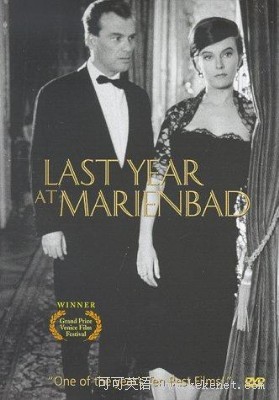
“我们去年在马里昂巴德见过吧?”路人甲(男)对路人乙(女)说,这部号称史上最难以理解的电影就这样开始了。这两位路人在一座法国古堡中就餐。其中一个人说他们认识,而另外一个人则不这么认为。两位主角不停滴在古堡中游走,同时导演的镜头则十分留恋古堡走廊上让人毛骨悚然的藤蔓。影片中不时地响起管风琴的声音,一些身着盛装的人出现在洒满阳关的草坪上,他们身后拖着影子,而他们身后三角形的树却没有影子。影片似乎没有什么剧情。这部电影到底要说什么?
Memento
《记忆的碎片》(2000)
Before Christopher Nolan's Inception, there was Memento, a great big puzzle of a movie whose protagonist suffers from short-term-memory loss. With the help of Polaroids, notes and tattoos (give him credit, the man is dedicated), Leonard Shelby tries to track down his wife's murderer, known only as "John G." As he tries to piece everything together, so does the audience, which sees much of the action as fragments shown in reverse chronological order. We alternate between black-and-white and color, forward movement and back, truth and lies. Leonard doesn't know whom to trust ... and neither do we.
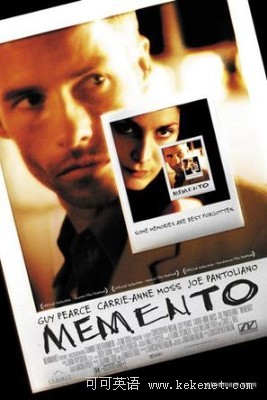
除了今年的《盗梦空间》,克里斯托弗·诺兰指导的影片《记忆的碎片》同样考验观众的智商。这部影片中,主角莱昂纳多·谢尔比患上了“短期记忆丧失症”,他们只能通过宝丽来快照、笔记和纹身来回忆起以前的事情,并由此寻找杀死他老婆的凶手“约翰·G”。当莱昂纳多试图将许多记忆的碎片拼接在一起时,银幕前的观众也正将电影中倒叙呈现的种种场景合成一个完整的故事。电影在黑白画面、现实和回忆,以及真实和谎言见不断闪回,主角莱昂纳多不知该信任谁……,当然观众也云来雾去。
2001: A Space Odyssey
《2001:太空漫游》(1968)
Stanley Kubrick's sci-fi classic had apes, astronauts (some hibernating), a mysterious monolith — and HAL, a talking computer. Despite the presence of a verbally active machine, there isn't much dialogue in 2001: A Space Odyssey. The emphasis is on the visuals, whose grandiosity is matched only by the film's symphonic soundtrack. As TIME noted when the movie came out — in suitably trippy and pre-moon-landing 1968 — "Kubrick turns the screen into a planetarium gone mad and provides the viewer with the closest equivalent to psychedelic experience this side of hallucinogens." The film, based on a short story by Arthur C. Clarke, won an Oscar for visual effects.
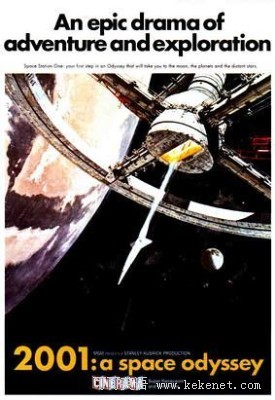
这部斯坦利·库布里奇的科幻电影中有猿猴、宇航员(其中有些人在冬眠)、一个神奇的石柱 —— 还有一部会说话的电脑HAL。尽管影片中有一台声控的机器,但纵观《2010:太空漫游》全篇几乎没有多少对话。影片的画面宏伟,同时配之以同样恢弘的交响乐。影片上映的1968年迷幻药盛行,且人类尚未登月。当时的《时代周刊》这样描述这部电影:“斯坦利·库布里奇将大银幕变成了一个疯狂的天文馆,并向观众体验了一把电影迷幻药的威力。”这部根据C·克拉克的短篇故事改变的电影最终荣膺了奥斯卡最佳视觉效果奖。
El Topo
《鼹鼠》(1970)
TIME's 1971 review of Chilean-Russian director Alejandro Jodorowsky's El Topo (The Mole) described the allegorical cult western film as "a vivid if ultimately passionless passion play." The film's 1970 trailer proclaimed, "It is a mystic film. It is tender. It is sexual." It is also a bit strange. A mysterious cowboy kills a group of outlaws before abandoning his naked son to ride off with a woman. El Topo (played by Jodorowsky) then embarks on a series of bizarre adventures. He challenges and defeats the four great gun masters of the land and then is betrayed by a woman with a man's voice who shoots him, leaving stigmata wounds. After El Topo heals and finds religious enlightenment, he begins an affair with a dwarf woman and helps a group of outcasts escape from a subterranean prison, only to see them massacred by cultists. That's when things really get weird. El Topo was a cult favorite at midnight showings in New York City before finally being released on DVD in 2007.
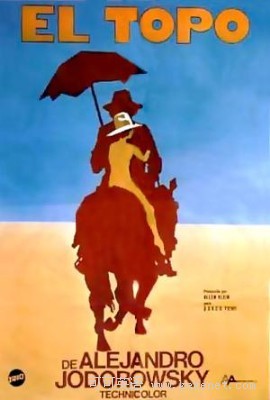
《时代周刊》在1971年这样评论俄籍智利导演亚历桑德罗·左杜洛夫斯基寓意丰富的cult电影《鼹鼠》“这是一部本质上毫无生气,却又栩栩如生的受难电影”。本片1970年的预告片宣称这是一部“充满神秘色彩的电影,温柔,并性感”。这也是一部与众不同的电影。一位神秘的牛仔杀死了一帮暴徒,然后抛弃了自己的儿子并用一位女子一同流浪。随后,牛仔“鼹鼠”(左杜洛夫斯基饰)经历了一系列光怪陆离的事件。他想“四大枪手”下战书并打败了他们,被一个假扮成男子的女人背叛,而且这个女人差点用手枪结束了他的性命。“鼹鼠”养好自己身上的枪伤后,又受到宗教的感化,并同一位侏儒相爱。他帮助一帮流浪汉越狱,但有眼睁睁地看着他们被邪教分子杀害。故事就是这么疯狂。在2007年DVD版发行前,《鼹鼠》一直都是纽约午夜场cult电影(午夜场电影通常为色情暴力影片,译者注)的大热门。
Pi
《圆周率》(1998)
Maximillian Cohen is a mathematician burdened by crippling social anxieties and an all-consuming belief in the power of his science. As he's about to discover a singular mathematical solution to the patterns of the universe (or so he believes), Cohen falls prey to the schemes of a clutch of cutthroat Wall Street bankers and a sect of Hasidic Jewish Kabbalists, both keen to profit from his revelation. What follows in Darren Aronofsky's black-and-white meta-thriller is a hallucinatory collapse, with an eerie score that sounds out the tormented, psychic depths of a man driven to insanity by his quest for order.

影片主角马克思密林·科恩是一位不谙世事、沉醉在自己世界里的数学家。当他即将用数学的方式解开世界运行之谜(或者说,至少他这么认为)时,科恩成为了华尔街银行家们以及一个试图破解宗教密码的犹太教团体的猎物。这两种人都希望从科恩的研究成果中获利。达伦·阿诺洛夫斯基这部黑白悬疑片背后,电影在试探人类心灵的深处,随着对科恩对数学模式的破解,他逐渐遭受精神错乱的折磨,但只这也推动者他去最求其中的规律。
大卫·林奇的全部作品
It's hard to say which of David Lynch's works is the craziest. A profound madness lurks beneath them all, from Eraserhead (1977), his trippy film-school debut, to Blue Velvet (1986) and the Twin Peaks TV series, all the way to Lost Highway (1997), Mulholland Dr. (2001) and Inland Empire (2006). Characters in Lynch films hover on the margins of reality, entering, through portal after portal, phantasmagoric dream worlds that are often as unsettling as they are hypnotic. Though Lynch runs a foundation that advocates a brand of popular meditation, there's little that's calming or stable about his vision. Beneath the thin sheen of daily life is an unfathomable, terrifying darkness. That, it seems, is what Lynch repeatedly tries to bring to light.
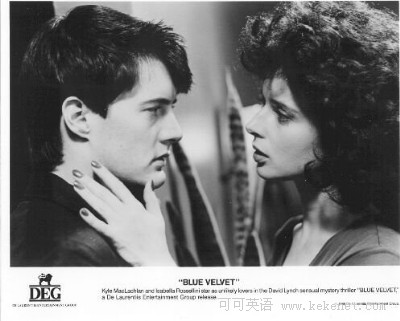
似乎很难从大卫·林奇的片子中摘出一部“最”疯狂的电影,因为他的每一部电影中都暗含着一种癫狂。无论是在电影学院小试牛刀并富有迷幻药色彩的《橡皮头》(1977),还是《蓝色天鹅绒》(1986)、电视剧《双峰》(1990),亦或是《妖夜荒踪》(1997)、《穆赫兰道》(2001)和《内陆帝国》(2006),这些片子都是无一例外让人为之疯狂。在大卫·林奇的电影中,主人公在游走在现实的边缘,通过各种不同的途径被催眠般进入飘忽捉摸、令人心神不宁的梦境。尽管大卫·林奇本人在运作一个倡导静坐沉思的基金会,但在他的影像里似乎没有任何冷静和稳固的东西。在光鲜的日常生活背后,隐藏的是深不可测、令人毛骨悚然的黑暗。而大卫·林奇似乎要将这些东西暴露出来。
Fight Club
《搏击俱乐部》(1999)
Fight Club the movie — based on the Chuck Palahniuk novel of the same name — is the story of a boring white-collar stiff played by Ed Norton who joins an underground fighting club run by a man called Tyler Durden (Brad Pitt). Norton and Pitt spend most of the movie beating each other up — until the end, when Norton realizes Pitt doesn't actually exist. He then shoots himself in the face to "kill" his imaginary friend. (Funny, Brad Pitt is also our imaginary friend, but for an entirely different reason). Oh, and Norton's love interest in Fight Club is played by Helena Bonham Carter, which is strange because Tim Burton didn't direct it.
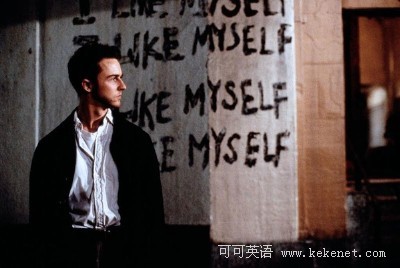
电影《搏击俱乐部》改编自昌克·帕拉尼克同名小说。影片中,由爱德华·诺顿饰演的百无聊赖的白领参加了泰勒·杜登(布拉德·皮特饰)组织的地下搏击俱乐部。爱德华·诺顿和布拉德·皮特在电影中几乎通篇是拳脚相加——直到影片最后,诺顿意识到皮特其实并不存在。然后,他便向自己的脑袋开枪以试图“杀死”他想象中的朋友皮特。还有就是,《搏击俱乐部》中布爱德华·诺顿的情人是有海伦娜·卡特饰演的,而这部电影去并非出自蒂姆·伯顿之手,有意思。
Brazil
《妙想天开》(1985)
We've seen Terry Gilliam's Brazil three times, and we're still not sure what's going on. Something about a dystopian future? A man named Sam Lowry is hired to investigate a printer jam that led to the accidental imprisonment and death of a regular citizen, Archibald Buttle, instead of a wanted terrorist, Archibald Tuttle. Is that what's going on? We have no idea. The terrorist (played by Robert De Niro) is also an air-conditioner repairman who at one point helps Lowry fix his broken AC. Some people are arrested; other people fall into a bottomless casket during a funeral. Then things get really weird. Is Brazil supposed to be real, or is the entire story unfolding in the mind of its main character, a delusional, doped-up Lowry who has been declared clinically ? Who knows.
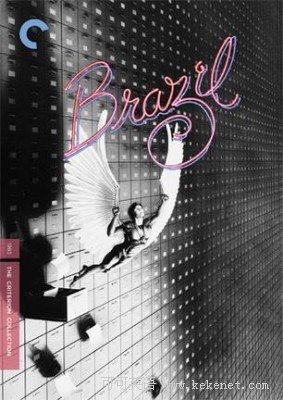
特瑞·吉列姆的电影《妙想天开》我一共看了三次,但仍对影片要讲的东西似乎依旧一知半解。打印机的一个小错误导致了普通人阿奇巴德·巴特被捕和惨死,这次行动的真正目标是受到通缉的恐怖分子阿奇巴德·塔特。萨姆·罗瑞受命调查此事。然后呢?我不知道。罗伯特·德尼罗饰演的恐怖分子的另外一个身份是曾为罗瑞修理空调的空调修理师。有些人被捕,还有些人则在葬礼上跌落到了无底的棺材中。一切都是这么疯狂。这部电影描写的是现实、还是在向观众不断呈现精神错乱、充满幻想的萨姆·罗瑞的内心世界?
Persona
《假面》(1966)
In his memoirs, legendary Swedish director Ingmar Bergman said of Persona, "I had gone as far as I could go ... I touched wordless secrets that only the cinema can discover." A minimalist production about an actress who suddenly goes mute and the nurse who cares for her in an isolated seaside cottage, Persona begins with a prelude: a projector shows several brief images, including a crucifixion, an erect penis, a cartoon, a tarantula, children in Halloween costumes, a lamb being slaughtered and, finally, an emaciated boy who wakes up in a hospital and touches a blurry image of a woman's face. The title cards feature more split-second images, including what appears to be a self-immolating monk in Vietnam. What follows is a three-act drama about identity, loss and memory, one that influenced directors from Woody Allen to David Lynch.

在其回忆录中,瑞典传奇导演英格曼·伯格曼这样描述他的这部电影:“这是我能做到的极致……我触到了只有摄影机才能发现的无法言说的秘密。”这部抽象主义的影片讲述了一位突然失声的女演员和照顾她的护士在与世隔绝的海边别墅中的发生的故事。影片开始的画面是这样的:一家投影机投射出一些简单的图片,包括十字架、勃起的阳具、卡通人物、一只大狼蛛(一种大型蜘蛛,译者注)、身着万圣节服装的孩子们、一只待宰杀的羊、一个在医院中醒来的瘦弱男孩,以及一个女人模糊不清的面颊。影片标题出现时背景是很多转瞬即逝的画面,其中包括一个自杀的越南僧人的画面。再接下来便是一个探讨身份、失去和记忆的三幕剧。伍迪·艾伦和大卫·林奇都曾受到这出三幕剧的影响。
Blade Runner
《银翼杀手》(1982)
In late 1981, director Ridley Scott showed Philip K. Dick an early cut of Blade Runner. Dick, who authored the book Do Androids Dream of Electric Sheep? — on which Blade Runner was based — said, "You would literally have to go five times to see it before you could assimilate the information that is fired at you." A richly textured mashup of Raymond Chandler–esque noir and dystopian nightmare, Blade Runner tells the story of a detective who hunts down and retires advanced androids called replicants. Like all great science fiction, the film asked big questions, like, What does it really mean to be human? (And slightly smaller questions like, Is Harrison Ford a robot or not?) Blade Runner baffled test audiences in early 1982, causing the studio to add a voice-over narration and change the ending, using leftover shots from Stanley Kubrick's The Shining. To date, seven different versions of the film have been shown, and if that isn't cause for confusion, we don't know what is.
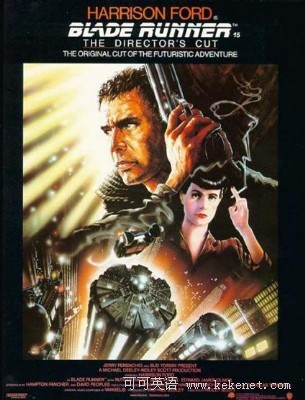
1981年末,导演雷德利·斯科特向菲利普·迪克《银翼杀手》的粗剪版时,《银翼杀手》的原著小说《机器人梦见的是电子羊吗?》的作者菲利普·迪克这样说:“如果想理解这部电影的真正内涵,你最起码也要把他看五遍。”这是一部机构丰富混搭作品,影片混合了雷蒙德·钱德勒式的黑色幽默和反乌托邦式的噩梦。和所有伟大的科幻电影一样,《银翼杀手》向观众提出了这样宏大的问题:身为人类到底意味着什么?(小一点的问题是:影片中的哈里斯·福特到底是人还是机器人?)。1982年出,《银翼杀手》上映,当时的观众实在无法看懂,最后制片方只好为影片配上旁白,并使用斯坦利·库布里奇的影片《闪灵》的备用结尾作为影片的结局。时至今日,已经有七个不同版本的《银翼杀手》面世,如果这不叫“让人费脑子”的电影的话,那就没有其他电影能进入这张榜单了。


